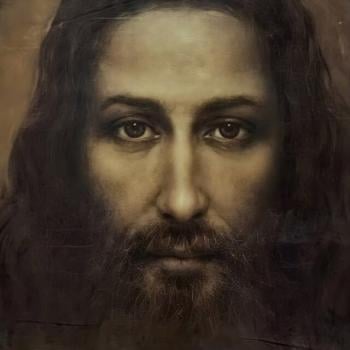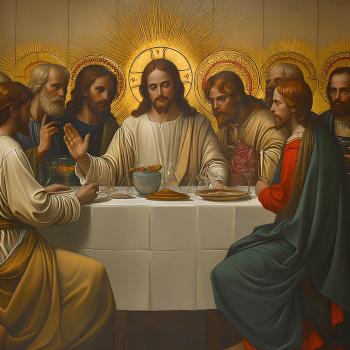We should clarify that you're listing Luke here in the fourth position in acknowledgment of the ancient ordering of that gospel as connected to Acts. There are some Bibles, available today, that reunite Luke and Acts.
Yes, I'm speaking to the ancient tradition in which there is a slightly different order to the gospels than we find in most of our Bibles today.
Let's talk for a moment about each of the four gospels. Now, you devote big chunks of your book to discussing each gospel's path. Here, we're going to try to give readers just a few words on each one, to give readers a feel for what they'll be able to explore in your book.
I'm demonstrating how each gospel was not written to the question: Can you tell me about Jesus' life? Rather, I think the gospels were written to answer: Can you tell me about the life of Christ in this question?
So, starting with Matthew, I see this gospel as written to show us how to begin to work through moments of change. This gospel was composed at a particular moment for a particular people wrestling with a big change in their lives: the destruction of the temple in Jerusalem by the Romans. This gospel becomes a way of understanding how to move through such a moment of change -- over and over again over time. Can we face change on this level in our lives?
And Mark?
Mark is one of the most disturbing and inspiring sacred texts I know. From the first line to the last line as a teaching of the Risen One, we learn that in the midst of resurrection there also is suffering. Because of the Risen One, we can move into and endure suffering.
This is the great paradox, because in essence this text is teaching us both about how to quickly move through suffering, but it's also telling us there will be times in our lives and our history when we will have to endure suffering.
Then, John?
John has a profound mystery in it. John rises to the level of the world's absolutely greatest texts ever written. It opens with the idea that there is one source from which all has come and to which all of us are accountable. Then it gives us the meditations on that one source that keep us from claiming it in a narrow way. John is Christianity's highest glory.
I realize that we're not really doing justice to these gospels or to your analysis of them, but at least we're giving readers a little frame of reference here to what they'll find in your book. So, finally, let's say a word about Luke.
I would prefer to think of Luke-Acts as one body of texts. It's the largest writing in the Christian testament and it's a series of teaching stories about maturing in compassion and service, and my theme here is that we are going to offer transformation one heart, one heart, one heart, one heart.
I see Luke-Acts as a practical text today as we move beyond ourselves and into discussions -- passionate dialogues with differing views in our world. We must speak truth to power and yet we must move beyond our dualistic way of seeing the world -- our dualistic politics, for example -- and see that we can be one people, one community, one planet.
You argue that, ultimately, we're all on one journey as people on this planet, right?
The truth is that we are all making one journey on this planet. The ways that we walk, and what we each need to do in our life, and the kinds of things we can carry with us in our backpacks -- these are the things that the world's great traditions have given us for the journey.
We may take this journey in different ways. Some of us travel alone. Some of us like to travel two by two. Some of us like to do this by ship. Some of us like to take a bicycle. Some of us are more visual. Some of us are auditory. Some of us are contemplative. Some of us are social activists. But there is a known journey and that journey is in every religious tradition and every psychological school and it's mapped. I say there is one truth. But there are many pathways.
With so much suffering and so many crises in the world, are you hopeful as you publish this new book?
I believe in the journey and I believe the journey is always moving us toward more love, more healing, more compassion, more faith.
In the macro view, I see the world today as somewhere in the second path -- the path of Mark -- and I know what comes next for all of us on this journey. Next is John and a great coming together and, then, after John comes Luke. We won't just be coming together. We'll be coming together for service.
If that's optimism, sign me up. I hesitate in using terms like optimism or hope, because it's really neither for me: I know.
I know.
This article was originally published at Read The Spirit and is reprinted with permission.
David Crumm is an author, journalist, and filmmaker with more than twenty years of experience as a Religion Writer for the Detroit Free Press, Knight-Ridder newspapers, and Gannett. Crumm is now the Editor of ReadTheSpirit -- a new online home for important voices in religion and spirituality.




